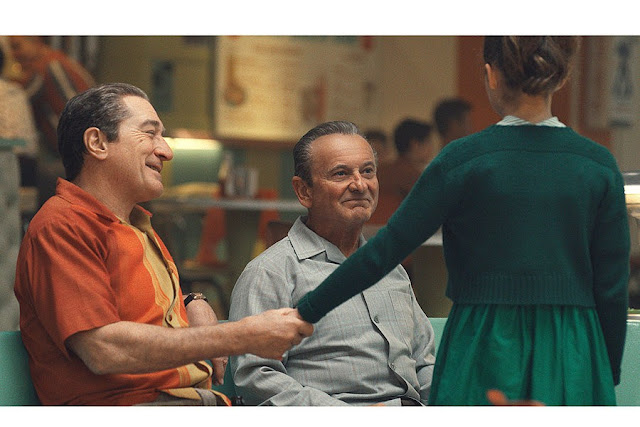THE IRISHMAN and the Lost Children of Scorsese
Martin Scorsese's ongoing fascination with the emotionally scarred children of crime families culminates with his latest film.
By: Josh McCormack
For a filmmaker with such volatile, explosive energy as Martin Scorsese, a director whose greatest contributions to cinema consist of some of the most well worded insults or comebacks ever uttered on the silver screen, The Irishman ultimately succeeds for its powerful silences.
Most of these powerful silences come from Peggy Sheeran, the daughter of Robert De Niro's lead mob hitman, Frank Sheeran. From her first moment on screen there's a palpable tension between her and her father. Something unsaid, but something that Scorsese is intentionally punctuating almost every shameful act of our titular character with. Peggy ages, like everyone else over this decade spanning epic, but with growing older, her disdain for the man who raised her grows as well.
The silence of Peggy has been debated amongst film circles for weeks ever since the film's premiere, with some critics calling it an example of how underwritten Scorsese's female characters are to their male counterparts. Whether this criticism has any validity is completely beside the point when it comes to the character of Peggy, a character who proves to be just as important--if not more so--than Al Pacino's Jimmy Hoffa.
When looking at the filmography of Martin Scorsese there's a correlation between other children of the same upbringing as Peggy in the director's other films that I don't feel is being touched on. In Goodfellas right after Henry Hill and his wife Karen get in their first domestic fight, the camera immediately pans to the young daughter, a silent observer who is clearly startled and confused by this display of anger and vitriol.
A similar image is seen in Wolf of Wall Street when Jordan Belfort, completely high on quaaludes, is screaming and embarrassingly writhing around in anger as his wife continuously screams at him. Scorsese's ever-precise camera once again focuses on the silent observer of the lead character's daughter.
Even in something as early in the filmmaker's career as 1980's Raging Bull, the children are heavily emphasized when Jake Lamotta goes to the family home of his brother to attack him in the fit of a jealous rage.
Frank Sheeran is a notably more low key character than these other examples. A former soldier who always followed orders, making him the perfect piece of clay for the mob to shape to their will. It leads to a lack of empathy, a lack of regret, and an inability to understand the shame he brought to his daughters.
Peggy Sheeran is the culmination of all of the lost and abused children of Scorsese's filmic past. She isn't given one scene to silently judge her father, like similar Scorsese characters of the past, but it's instead at the forefront of the The Irishman. These moments of silent judgement all hit our lead character in a way he might not fully understand until the end, but it culminates in a wonderful moment in which she finally questions her father. By simply asking "Why?" when he admits he has not yet called his former Jimmy Hoffa's wife after he has gone missing (actually the result of a murder that he committed), it clearly shakes Frank to his core and practically guilts him into getting on the phone. It's the closest thing to an actual conversation they have and it's the only one they have before she cuts him out of her life.
Perhaps with Scorsese's own struggles with drugs in the past, the fear of being an embarrassment to his family is what keeps him in fear. And in his old age it is perhaps the fear of being left alone in a room with no one by his side, just as Frank is in the film's final frame, is what drew Scorsese to tell this somber, heartbreaking tale.




Comments
Post a Comment